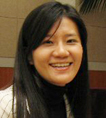Actors
Actors: authors and speakers

Ignacio Aedo (Foreseeing the Transformative Role of IT in Lectures)
Degree in Computer Science and Ph.D. in Computer Science from Universidad Politécnica de Madrid. He's currently full professor at the Universidad Carlos III de Madrid (Escuela Politécnica Superior). His interests mainly focus on topics such as hypermedia, interactive systems in education, web systems, electronic books, development methodologies and information systems for emergency situations. In 1990, he started his research activity in the field of interactive systems on which he is still involved. Director of Web Engineering Master; subdirector of Management and Production of e-learning Master; viceChair of IEEE Learning Technologies Technical Committee; adjunct Vice-chancellor for Faculty and Departments (UC3M).

Alessandra Agostini (Supporting cooperative learning in the classroom: Exploiting large multi-touch displays)
is Associate Professor at the DISCo Department of the University of Milano-Bicocca. Her main research interests are: ubiquitous and context-aware computing, cooperative learning, adaptive workflow management systems, communityware, and CSCW. She has taken part in various EU funded research projects on themes related to her research interests (e.g., MILK, COMIC); in particular, she has been project manager of the Esprit LTR Campiello project in which ubiquitous technologies have been experimented in supporting the cultural exchange among the community of people living in art cities and visitors. In Italy, Campiello has involved the local community of a sestiere and a secondary school in Venice. She has been involved in the Italian project WEB-MINDS which aims to design and develop a platform for ubiquitous remote access and service customization. Her group focused on integrated management of profile and preferences for context-aware services. Her main interest was on capturing complex context attributes related to users (e.g., user’s activity). At present, she is involved in designing and experimenting in Italian schools pervasive and adaptive systems supporting participative and cooperative learning in classrooms. The systems aim to support diversified interaction technologies (e.g., large multi-touch screens, pads, paper).

Madeline Balaam (Monitoring Affective and Motivational Aspects of Learning Experience with the Subtle Stone)
has worked on a number of Human Computer Interaction projects spanning education, healthcare and the home. Madeline is currently a research associate at Culture Lab, an interdisciplinary research institute within Newcastle University. She joined the Culture Lab eight months ago after completing a two year post-doc and a PhD at the University of Sussex. Madeline is dedicated to understanding people, their needs, motivations, lifestyle and their surroundings holistically to support both the design and evaluation of digital, interactive technologies. Madeline's PhD research focused on understanding students’ emotional experiences of learning within high school. As part of this she designed and developed a handheld technology that supports students in privately communicating their emotional experiences to their teacher throughout lessons. Madeline is a widely and internationally published researcher within the field of HCI.

Nicola Capuano (Improving Role Assignment in CSCL Script using SNA and Semantic Web)
is research assistant at the Dept. of Electronic Engineering and Information Engineering of the University of Salerno. He collaborates with the Centre for Research in Pure and Applied Mathematics (CRMPA) as project manager of research and development projects. He was coordinator of two IST FP5 Projects (InTraServ and Diogene) and scientifically represented and represents CRMPA in several EC and national projects. He's technical manager of the IST FP7 Project ALICE. He’s author of about 50 scientific papers published in Journals, Conference Proceedings and Books about Intelligent Tutoring Systems, Knowledge Representation and Distributed Systems. He’s scientific referee and member of editorial boards for International journals and conferences. He’s a Project Management Professional (PMP) certified by the Project Management Institute (PMI).

Paloma Dìaz (Foreseeing the Transformative Role of IT in Lectures)
Full professor at Universidad Carlos III de Madrid (Escuela Politécnica Superior) and head of the DEI research group. She holds a Degree in Computer Science and Ph.D. in Computer Science from Universidad Politécnica de Madrid. Her research interests mainly focus on topics such as web and hypermedia/web engineering methods combining usability principles and practices as well as their practical application to different kinds of interactive systems including e-learning and e-gov. She was, 2004-2007, Director of the Computer Science Doctorate Programme and of the Master in Computer Science and Technology (Universidad Calos III de Madrid) both holding a Quality mention from the Spanish Ministry of Education and Science. She is also Scientific Manager of National Programme of I+D for Technology for Services of Information Society (Spanish Ministry of Science and Innovation).

Elisa Di Biase (Supporting cooperative learning in the classroom: Exploiting large multi-touch displays)
is a Ph.D Student at the Interdepartmental Centre of Higher Education and Advanced Research QUA_SI (Quality of life in Information Society) of the University of Milano-Bicocca, where she obtained her M.Sc. degree in Informatics in 2009. She has also an Academic Diploma of 2nd level in Musical Disciplines: interpretative-compositional field of study for piano, and has been teaching for six years in public Middle School. From 2010 she focused her research interests on Computer Supported Collaborative Learning, Pervasive & Participatory Learning and had a talk in Mannheim during PerEL 2010: The 6^th IEEE International Workshop on Pervasive Learning. At present she is teaching assistant for the course “Cooperation Technologies” for the B.Sc. degree in Informatics and is involved in the experimental phase of his doctoral thesis on pervasive and adaptive systems supporting participative and cooperative learning in classrooms.

Mici Halse (A Motivation for 'Ubuntu' to Enhance e-Learning Social Network Services in South Africa)
is a Lecturer in the Department of Computer Science at Rhodes University, Grahamstown, South Africa, working towards her PhD. Her areas of interest include research in advanced learning technologies and the relationships between learning styles and factors such as gender and culture. She is also interested in the relationships between culture, community and learning with a specific focus on how African and South African cultures differ from Western cultures and the implications thereof for learning and the design and use of advanced learning technologies. The design and online facilitation of both asynchronous and synchronous environments is of particular interest, and she has worked extensively in the the area of synchronous virtual learning and conferencing.

Carlo Giovannella (Toward a general model of the learning experience)
expert in the technology-enhanced learning, interaction and design for the experience, computer-mediated communication, design and management of processes, and process and product innovation. He is currently at Physics Dept. and the IaD School (Distance Learning Department) of the University of Rome Tor Vergata, where he is chair of the ISIM_garage (Interfaces and Multimodal Interactive Systems), a research and development lab devoted to design and development of TEL-environments, tools and methods for education, design for the experience, and more. He is also a designer and chair of the project LIFE, an innovative learning environment of new generation.

Salvatore Iaconesi (As We May Remix. REFF Book and the Augmented Press Experience)
robotics engineer, interaction designer, artist. Currently teaches Cross Media Design at the Faculty of Architecture or Rome's University 'La Sapienza'. Salvatore contributed to the creation of FakePress Publishing, an innovative think-tank and publishing house focusing on the future scenarios for ubiquitous media, augmented reality, innovative interfaces and interaction paradigms, and disruptive scenarios for knowledge dissemination. With FakePress and Art is Open Source Salvatore has exhibited all over the world works of interactive architecture, wearable technologies, infoaesthetics, ubiquitous narratives and works of net art. He wrote two books, published many academic papers and actively participates to the international research community.

ChanMin Kim (Monitoring Affective and Motivational Aspects of Learning Experience with the Subtle Stone)
is an Assistant Professor of Educational Psychology and Instructional Technology at the University of Georgia. Her Ph.D. is in Instructional Systems from Florida State University. Dr. Kim's primary interests are in the intersection of cognitive and non-cognitive aspects of teaching and learning, especially as they interact with technologies. Her research agenda involves improving learning in domains typically regarded as challenging or difficult. She focuses on facilitating learners' emotion control, motivation and self-regulation throughout the implementation of a virtual change agent in online learning environments. Dr. Kim has several articles that are published in prestigious journals in the field of instructional design and technology as well as educational psychology

Giuseppe Laria (Improving Role Assignment in CSCL Script using SNA and Semantic Web
obtains the B.S. degree in Electronic Engineering at the University of Salerno. His research activities initially concerned with the study of: Grid technologies and their application in the business and learning domain; Commodity Technologies to implement Grid Service and their integration with COTS components; SOA and Next Generation Grid for ebusiness; SOA for designing of VO management framework. He has been holder of research contracts at the University of Salerno working on ‘Grid Technologies and Applications’ and on “lifecycle management of multimedia didactical content in distributed environment”. He has been working at the research centre “Centro di Ricerca in Matematica Pura ed Applicata” since 2002 participating in several FP5 and FP6 European Project (GRASP, Akogrimo, eLeGI, BREIN, and Qualipso). Currently he is mainly involved in ARISTOTELE FP7 European project focusing his research studies on organizational learning and integration of learning within business processes of the organizations.

Brenda Mallinson (A Motivation for 'Ubuntu' to Enhance e-Learning Social Network Services in South Africa)
is currently employed as Programme Specialist, ICTs in Education, at the South African Institute for Distance Education (SAIDE) in Johannesburg, and is involved in a number of Educational Technology projects at Higher Education Institutions in sub-Saharan Africa, including the Partnership for Higher Education in Africa (PHEA) Educational Technology Initiative (ETI), and the AgShare OER project. She is also a Research Associate at the Department of Information Systems, Rhodes University (RU), South Africa, having previously lectured in this Department from 1999 to 2007. Prior to this, Brenda’s growing interest in Educational Technology prompted a move from a lecturing position in the Computer Science Department to run the Computer Based Education Unit (CBEU) at RU from 1994 to 1998. While at RU, established and led a research group in Advanced Learning Technologies (ALT), as well as implemented a post-graduate coursework module in ALT for Information Systems and Computer Science students, both at Rhodes University and at the University of Fort Hare.

Giuseppina Rita Mangione (Improving Role Assignment in CSCL Script using SNA and Semantic Web)
is PhD in Telematics and Information Society by the Telematics Laboratory of the Electronics and Tele-communications Department of the University of Florence. In 2003 she was granted the post-graduate Master title in 'e-Learning Project Management and Design' by the University of Florence; In 2004 she was granted the post-graduate Master title in 'Multimediality for E-learning' by the University of Rome 3. Since 2003 she is Member of the directorate of SIe-L (the Italian e-Learning Association) and collaborates with the journal Jelks. Since 2006 she acts also a scientific collaborator for the CEMSAC - Centre of Excellence for Learning & Knowledge Methods and Systems)- University of Salerno- and as manager in Methods and Pedagogies sector. She collaborate whit CRMPA for research projects financed under the 7th FP taking the role of Responsible and Coordinator of the activity related to the Pedagogical and Didactical Models. Her main research interests technology enhanced learning, Social learning, Knowledge elicitation in learning environment, adaptive learning. She published papers in international journals, conference proceedings and book chapters.

Elvis Mazzoni (Improving Role Assignment in CSCL Script using SNA and Semantic Web)
is researcher and social network analyst at the Faculty of Psychology of the Alma Mater Studiorum - University of Bologna. He is also member of the Editorial Board of the Journal of Cyberpsychology, Behavior, and Social Networking and assistant editor of the European Journal of Psychology of Education. He collaborates as reviewer with many international journals and he has been and is involved in many national and international e-learning research projects connected to its principal research interests: the co-evolution of web technologies and human activities; web artifacts in educational and vocational training environments; web communities and web social networks in e-learning contexts; networked flow and network creativity.

Fabrizia Moggio (Toward a general model of the learning experience)
graduated in Industrial Design at the 'La Sapienza' University in Rome, she is attending a Master in Product Design. In 2007 she took part in the 'Lissone Design' competition resulting in the top 10 with a project for children. In the same year she took part in the 'Ikea' workshop organized by 'La Sapienza' University. In 2009 she got a special award for her participation in the 'Designer School UNICAM 2009'. At present she is involved in a 'Design for the experience' project focused on 'services for the moving tourist' at the ISIM_garage of the 'Tor Vergata' University in Rome.

Federico Monaco (As We May Remix. REFF Book and the Augmented Press Experience)
is an independent researcher in STS (Science, Technology & Society) and LIS (Librarianship & Information Science). He graduated in Sociology – Communications and Mass-media studies from the University of Rome La Sapienza in 2003. He has a Master in Diplomatic Careers and International and European Organizations from the University of Parma, where he obtained in 2009 a Ph.D. in Sociology and Political Systems. He is currently involved in national and european programs of research in the areas of Cyberinfrastructures, Digital Humanities and Digital Libraries. He has heterogeneous interests as much as a wide experience in the field of education, social theory and cognitive studies. He has been teaching Organizational Behavior at Boston College and Anthropology for future obstetricians at Maggiore Hospital of Parma. Since last year is tutor of DILL (Digital International Librarianship) Erasmus Mundus Master in Parma. He is actively cooperating in innovative experimental projects for infrastructures of knowledge. At University of Parma has got a scholarship for the internazionalization of Digital librarianship and is a promoter of Virtual Learning Environments and Openeya as tools for education and e-learning. He has been active for 20 years in the empirical and professional field of education and social welfare in Italy and Europe for handicap people and for youngsters.

Anna Pierri (Improving Role Assignment in CSCL Script using SNA and Semantic Web)
graduated Cum Laude in Mathematics at the University of Salerno in 2003. At present she is PhD student in Mathematics at the Faculty of Mathematics of the same university. She also collaborates with the Department of Electronic Engineering and Information Engineering – DIEII- and the CRMPA for research TEL projects financed under the 7th FP of the European Commission; in the specific she is Project Manager of the ALICE “Adaptive Learning via Intuitive/Interactive, Collaborative and Emotional systems” Project.
She was Dissemination Manager in the framework of the EU funded project ELEGI, and Responsible and Coordinator of the activity related to the “Pedagogical and Didactical References”. Her scientific research activity is focused on various fields: Learning Platforms, Artificial Intelligence and Learning Methodologies and Technologies.

Luca Simeone (As We May Remix. REFF Book and the Augmented Press Experience)
teaches design anthropology and interaction design at La Sapienza University and Ateneo Impresa Graduate Business School in Rome. He has published many papers on design anthropology and ethnographic methods applied to design practices and co-edited the books 'Beyond Ethnographic Writing' (Armando, 2010) and 'REFF' (DeriveApprodi, 2010) exploring new narratives that combine traditional writing with augmented reality technologies. In 2009 he founded FakePress, a think tank exploring the future of publishing and in 2011 he was a research affiliate with the SENSEable City Lab at Massachusetts Institute of Technology (MIT) in Cambridge MA. He is also the founder and user experience director of Vianet, a digital design agency based in Rome, Doha and Toronto. He works also as independent expert for the European Commission and for the German Aerospace Center.

Telmo Zarraonandia (Foreseeing the Transformative Role of IT in Lectures)
holds a degree and a PhD in Computer Science from the Universidad de Deusto and the Universidad Carlos III de Madrid respectively He joined the computer science department of the Universidad Carlos III de Madrid in 2003 as assistant professor. He has participated in several projects related to the field of computer supported education and interactive systems. He has published several scientific papers in international journals and conferences.

Imran A. Zualkernan (InfoCoral: Open-Source Hardware for Low-Cost, High-Density Concurrent Simple Response Ubiquitous Systems)
assistant Professor at American University of Sharjah. He has a demonstrated research and consulting experience in management and implementation of software solutions with a special emphasis on software engineering and Internet-based e-learning applications. He has diverse research and development exposure in auditing, statistical experimental design, hardware and VLSI manufacturing and in knowledge-based systems. He has done knowledge management work for multiple divisions of IBM including Owego, York Town, Rochester and East Fishkill, USA. He has taught at the University of Minnesota and at Penn State University and has research publications that span cognitive science, management science and computer science and engineering. He also has been the principal design engineer for the development and deployment of compilers and interface products for high-end robotic applications. Most recently, he has been involved in startup technology companies doing offshore software development and developing software engineering environments and products for the e-learning marketplace.



